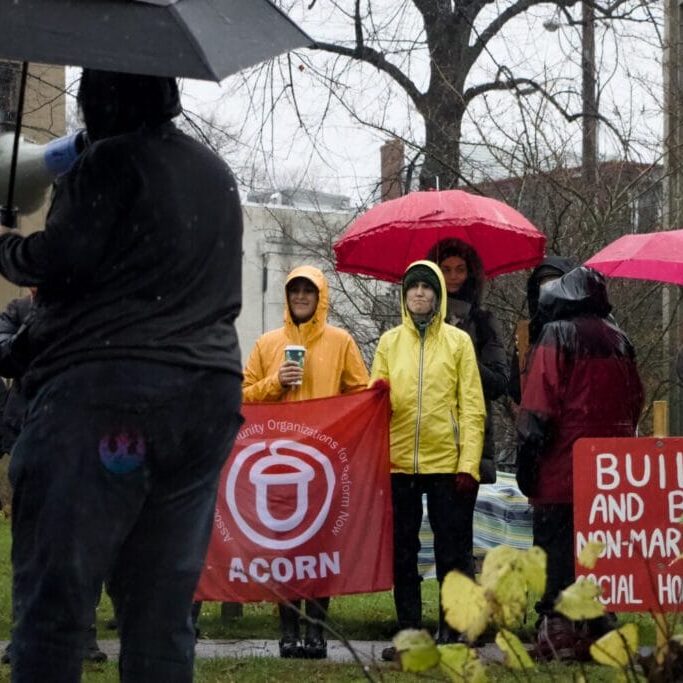
‘It’s not a policy puzzle’: ACORN members speak out on Nova Scotia’s tenant rights
The organization is advocating for housing including rent control and fixed term lease controls
On Saturday, Nov. 23, ACORN members, supporters and activists braved the downpour outside the Halifax Memorial Library to challenge the current and future government parties on Nova Scotia tenant rights.
ACORN, or Association of Community Organizations for Reform Now, is a nationwide collective that supports, upholds, identifies and enforces community-first rights and legislation. Their work focuses on dismantling the housing crisis, enforcing affordable internet pricing, disability rights and raising minimum wages.
In front of the Halifax Memorial Library, ACORN members shouted through a megaphone calling for government officials to bring back permanent rent control, ban the fixed-term lease loophole and build and buy non-market social housing.
ACORN fights for rent control in the face of increasingly high rent costs. The average rent for a one bedroom apartment in Halifax rose by 10 per cent to $2,050 from August 2023 to August 2024. The average price of a two bedroom rose by 18.2 per cent to $2,669 across the same period according to CTV.
Magaret Anne McHugh, co-chair of ACORN’s Dartmouth chapter, says, “After four years, my rent will have increased by 29 per cent, because it’s compounded. I’m already paying more rent than I can really afford.”
McHugh worries that students, minimum wage earners, seniors and families are unable to afford housing.
“It is just unfair that people with kids can’t be properly housed,” McHugh says. “The number of unhoused people, the number of precariously housed people [is unacceptable]. Forty-eight per cent of the people in Halifax are renters. And they have no protections, really.”
ACORN has been dedicated to tackling fixed-term leases. These leases do not automatically renew, giving landlords the opportunity to replace current tenants with new ones, skirting around the rent cap.
According to CBC, “Unlike a periodic lease, a fixed-term lease does not automatically renew beyond its set end date. The provincial rent cap covers periodic leases and situations in which a landlord signs a new fixed-term lease with the same tenant. However, there is no rule preventing a landlord from raising the rent as much as they want after the term of a fixed lease expires — as long as they lease to someone new.”
Fixed-term leases can cause rent prices to soar with few limits, uncertainty in renters and a clear reason for landlords to induce evictions.
“We don’t have a rent control system,” McHugh says. “Part of a rent control system would mean that just cause [tenants] left, [landlords] could double the rent, and with the fixed-term loophole we can’t control this.”
Non-market social housing is a longer-term commitment to the housing crisis. This includes co-ops, subsidized living and senior support.
However, non-market housing is a less popular choice for real estate developers.
As McHugh says, “No for-profit developer can build affordable housing today as the costs are around $400,000 a unit. They want their money back in 10 years, not amortized in 40 years. No landlord is going to build not-for-profit housing.”
Sam Paul, an ACORN member, says, “It is very important to vote, but that’s not the only way you can be involved, have influence and help yourself and your community.”
Speaking on the three policies the rally focused on, Paul says, “Our campaigns are all solutions and things we have had in this province before. It’s not a policy puzzle, it’s about political will and interest in who you feel you are serving.”
Christian Salmarone, an accompanying supporter and ACORN member says, “If you’re alone, you come together with organizations like ACORN, make your voice heard not just on election day but every day.”






